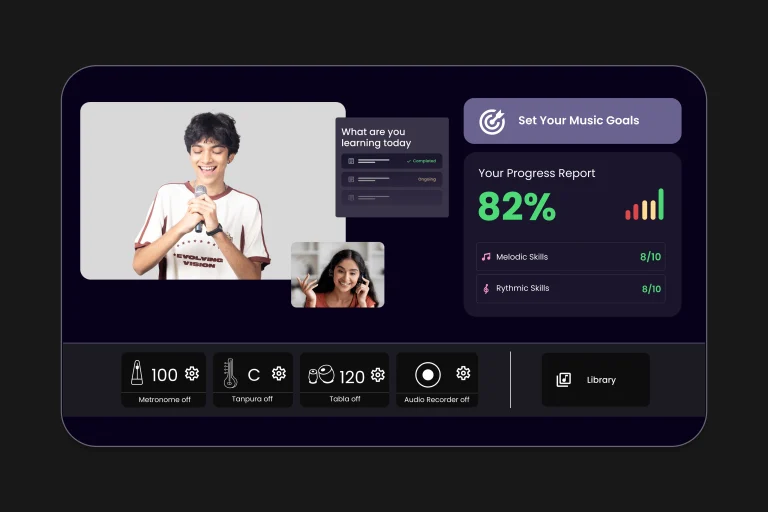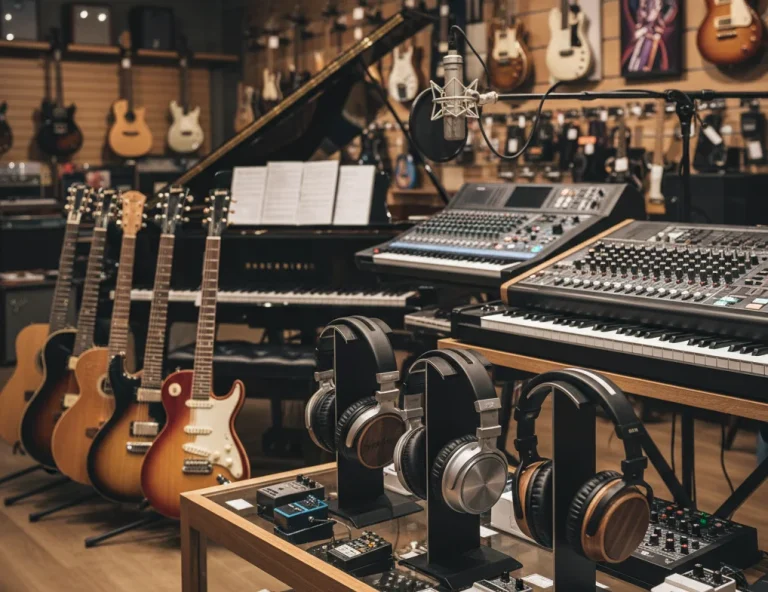All Topics
- Alchemizing Music Concepts for Students
- Artist Spotlight
- artium gift card
- Artium Maestros
- Artium News
- buying guide
- Carnatic Music
- Devotional Music
- Editorials by Ananth Vaidyanathan
- Film Music
- Guitar
- Hindustani Classical Music
- Indian Classical Music
- Indian Folk Music
- Insights
- Instruments
- Karaoke Singing
- Keyboard
- Kids Music
- maestros
- Music Education
- Music for Kids
- Music Industry
- Music Instruments
- Music Legends
- Music Theory
- Music Therapy
- Piano
- piano guide
- Success Stories
- Tamil Film Music
- Telugu Film Music
- Time Theory
- Tools
- Uncategorized
- Vocal Singing
- Vocals
- western classical music
- western music
- Western vocal music
Online Vs. Offline Music Classes: Which Works Better for Your Kid?
Online Vs. Offline Music Classes: Which Works Better for Your Kid?
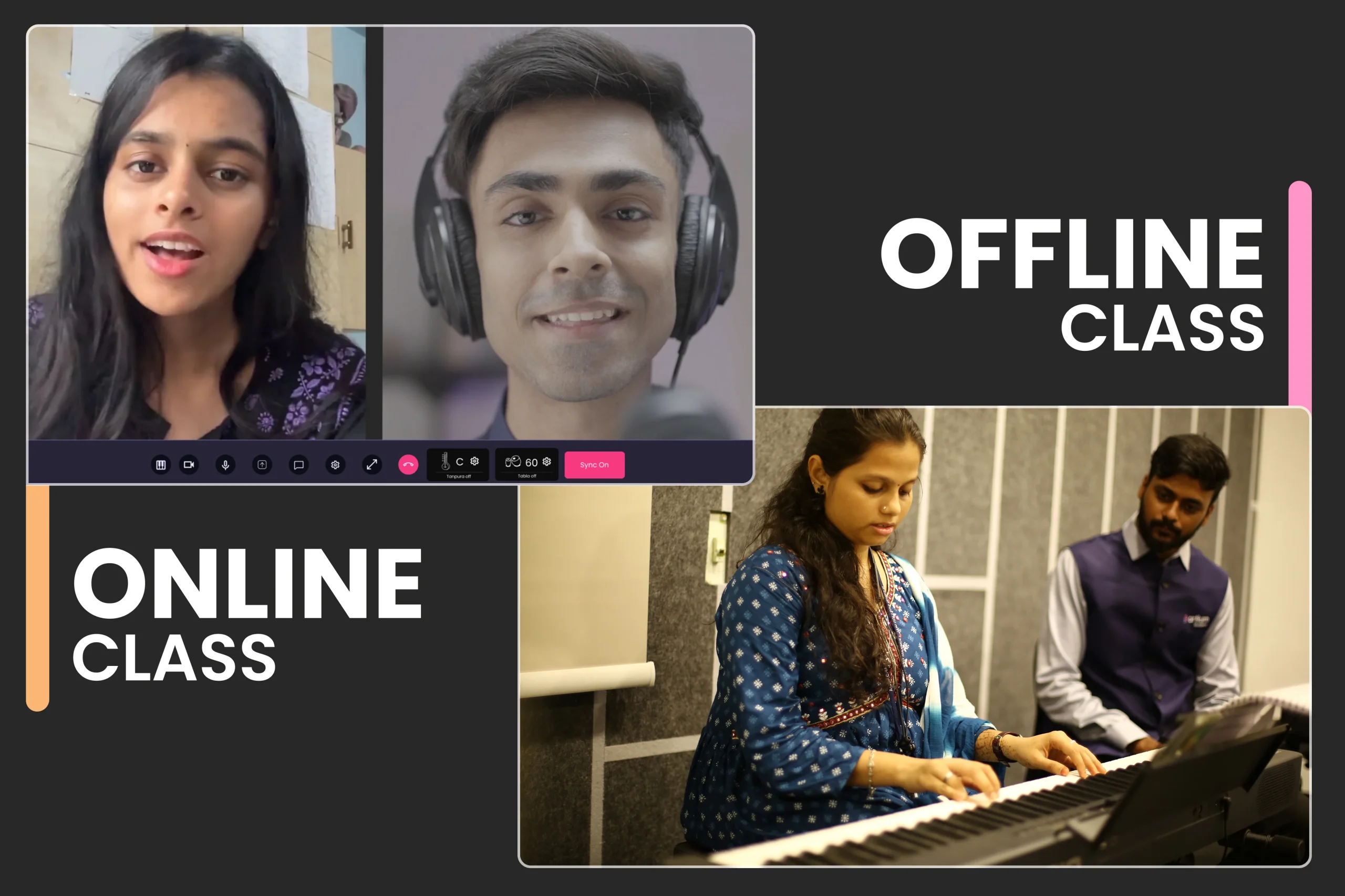
Table of Contents
Your child comes home, grabs a snack, and then sits down for their online singing classes, all at your kitchen table, with a world-class instructor.
Meanwhile, your neighbour has to drive across town for in-person music classes for kids. Now, there’s nothing wrong with it. Both are learning and progressing, but the main question is, which is the best approach to learning? Which one serves today’s aspiring musicians better?
The landscape of music for kids has changed dramatically in recent years. Gone are the days when you had to be physically present to learn from limited options in and around your area. Today, children have a universe of possibilities; they can learn from experts worldwide, right from their homes.
Given all these benefits, one might expect online learning to be popular. But it is otherwise. Traditional offline classes continue to hold their ground, offering tangible benefits that many parents still cherish. In 2025, this is one of the pressing questions all parents have: should they opt for offline learning or online music learning?
Recent studies are starting to show that children as young as 8 are spending more time in front of screens than ever. These are not just facts; they show a fundamental shift in how children learn, absorb information, engage with learning materials and develop skills.
How Do Online Music Classes for Kids Work in 2025?
Today, online music classes for kids are not just simple video calls with teachers. These classes use interactive platforms, real-time feedback systems, and advanced learning tools to create a great learning experience for the students. Learners are part of a dedicated learning environment where they can see their teachers, share their screen for sheet music review, and participate in virtual ensemble experiences.
The technology behind modern online singing classes for kids includes features like audio delay compensation, which addresses the traditional challenge of synchronizing sound over internet connections. Interactive whiteboards allow teachers to annotate music in real-time, while recording capabilities enable students to review their lessons and track progress over time. Many platforms now offer gamified learning experiences, incorporating elements that naturally appeal to children’s love of games and the desire for achievement.
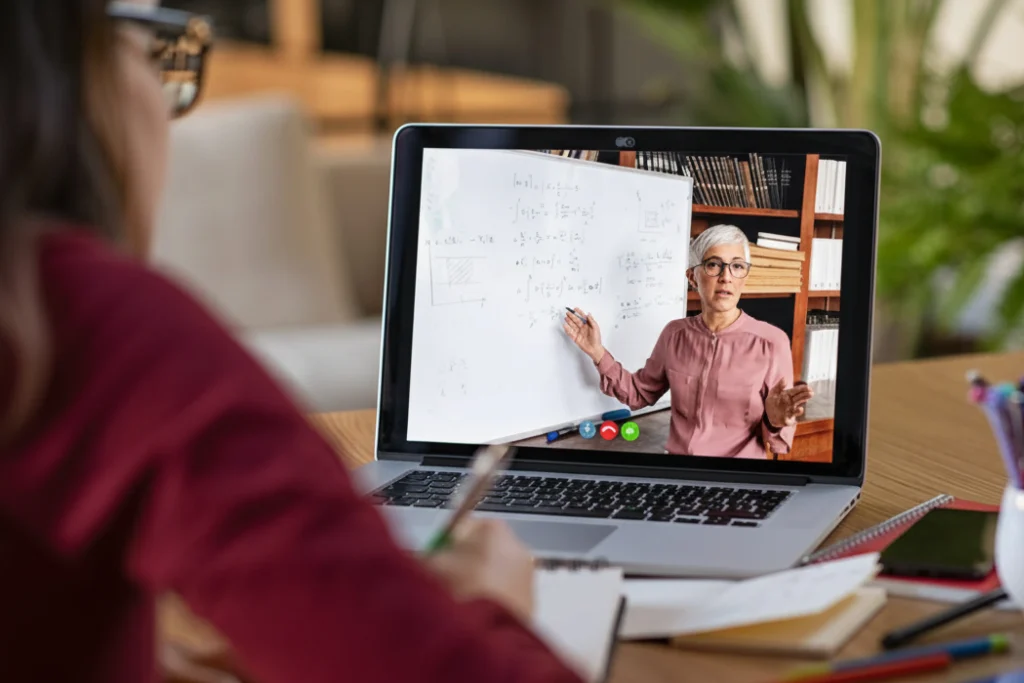
What makes these online music learning programs effective is their adaptability to different learning styles. Visual learners benefit from on-screen notation and video demonstrations, while auditory learners can focus intently on sound quality through good headphones. Kinesthetic learners engage through interactive exercises that translate physical movements into digital responses. This multi-sensory approach often surpasses what’s possible in traditional settings, where one teaching style may not reach every child effectively.
Offline Music Classes for Kids: The Traditional Foundation
Offline music classes for kids offer various advantages that resonate with parents, for instance, immediate, tangible feedback while learning music and musical instruments. In a piano class, the teacher can physically adjust hand positions, a violin teacher can demonstrate proper bow hold through guidance, and ensemble directors can create the magical experience of making music together in real-time.
Offline classes offer a proper segregation between learning time and home time. When a child enters a classroom or a studio, their minds automatically shift into learning mode. This helps children focus effectively in class more than they might in familiar home surroundings, where distractions are plentiful.
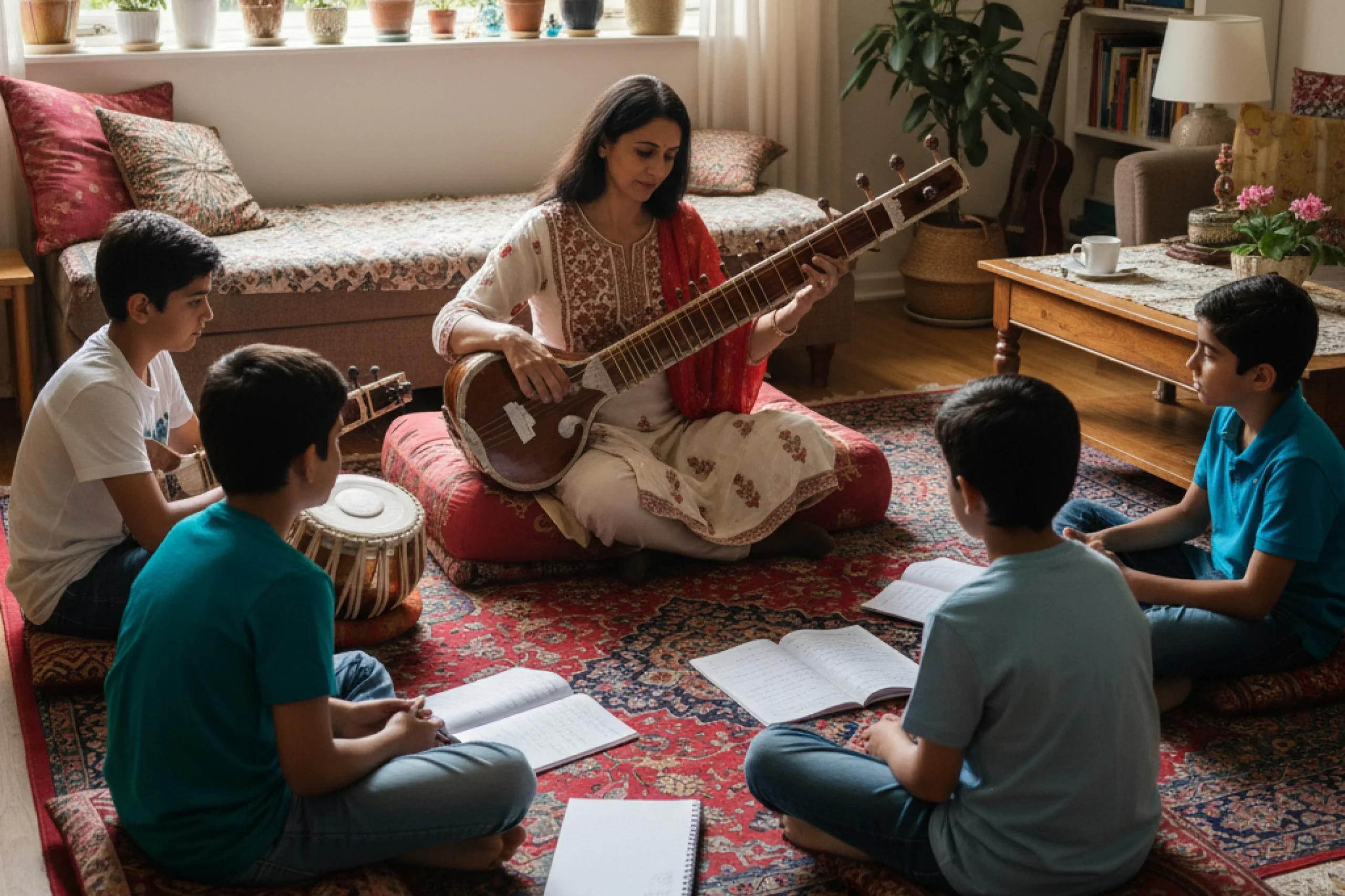
Group dynamics is one of the most important elements of offline learning. Interacting with fellow classmates becomes a natural source of motivation. Children tend to observe others’ progress, participate in competitions, and develop social skills. Many teachers believe group rehearsals, the excitement of preparing for live performances, and instant audience feedback provide irreplaceable emotional experience.
After pioneering the online music learning space, we also made our mark in the offline learning space. In 2024, we launched two offline music classes in Thoraipakkam and Alwarpet, Chennai, Tamil Nadu. Inaugurated by the legendary KS Chithra, these centres offer music classes to students in the Chennai area. With a state-of-the-art facility and top music instructors, these centres have quickly become the favorite music learning classes for Chennaiites.
Today, the courses offered by Artium to children include Indian classical music, encompassing Hindustani music and Carnatic classical music styles, as Well as Film music courses in Hindi, Tamil, Telugu, Kannada, and Malayalam. Additionally, there are instrumental courses, including piano and guitar.
Online Vs. Offline Music Class for Kids: Key Factors Parents Consider
When deciding between online music classes and offline ones, it is important to weigh the unique benefits each mode of learning offers. Online learning brings flexibility, global access to experts and cost effectiveness, while offline classes provide in-person guidance, structured discipline and richer group dynamics. The right choice depends on your goals, schedule and preferred learning environment.
| Factor | Online Music Classes | Offline Music Classes |
| Flexibility & Convenience | No travel timeFits into a busy scheduleAccess to experts worldwideLearn from home | – Provides structure & accountability – Develop routine & discipline through travel commitment – Clear separation of learning & home environment |
| Quality of Instruction & Feedback | Improvement in student performanceIncreased focusDecreased off-task behavior1:1 personalised attentionAccess to digital tools | – Immediate personal feedback & accountability – Hands-on teaching – Better for breath control, guitar, violin and other techniques – In-person demonstrations of techniques – Group dynamics & peer interaction |
| Cost Considerations | Less costly than in-person classesNo travelling neededDigital music books includedIncludes digital tools | – Costlier than online sessions – Includes travelling expenses – Access to physical resources – Opportunity to collaborate with other musicians |
Learning in Modern Times: Tech and Digital Engagement
Today’s children are more tech-savvy than ever. They demonstrate remarkable digital skills that fundamentally change how they absorb information. According to a study, statistics show that 53% of children have smartphones by the age of 11, increasing to 69% by the age of 12. More importantly, 57.6% of young children use devices for less than an hour daily. While the average time spent online has increased, what matters more is the quality, not the quantity, of digital engagement.
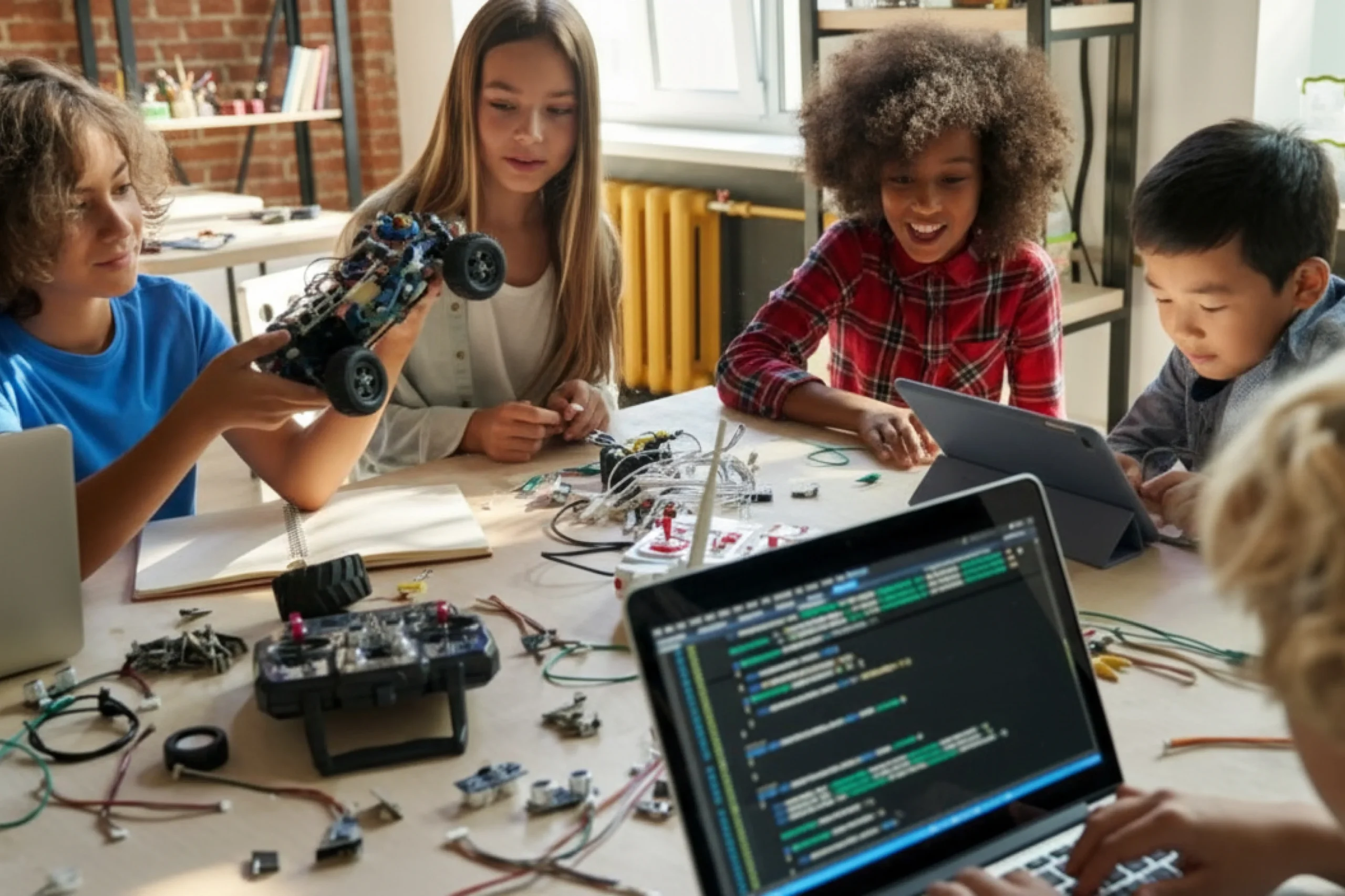
The arrival of technology has brought more opportunities for today’s children than previous generations could have imagined. Today, children are more intuitive in navigating music apps, engage with gamified learning systems, and show comfort with digital sheet music. Not only that, but they can also multitask between listening, watching, and participating through digital interfaces, which aligns perfectly with online learning formats.
However, research also reveals important considerations about screen time and cognitive development. Studies indicate that children who start using smartphones before the age of 13 may experience challenges with emotional regulation and attention span. This finding highlights the importance of structured, educational screen time through online music classes for children, rather than the passive consumption of digital entertainment.
The key lies in leveraging children’s natural digital capabilities while maintaining focus on musical skill development. Well-designed online singing classes incorporate interactive elements that feel like play while building serious musical competencies. Children often engage more deeply with these structured digital experiences than they might with traditional instructional methods that don’t align with their digital learning preferences.
Why Online Music Education Offers Distinct Advantages?
The effectiveness of online music for kids extends beyond convenience into genuine educational benefits. Research consistently demonstrates that online learning, when properly implemented, produces outcomes comparable to or better than traditional instruction. The personalized nature of most online music lessons allows teachers to adapt instantly to individual learning paces and styles.
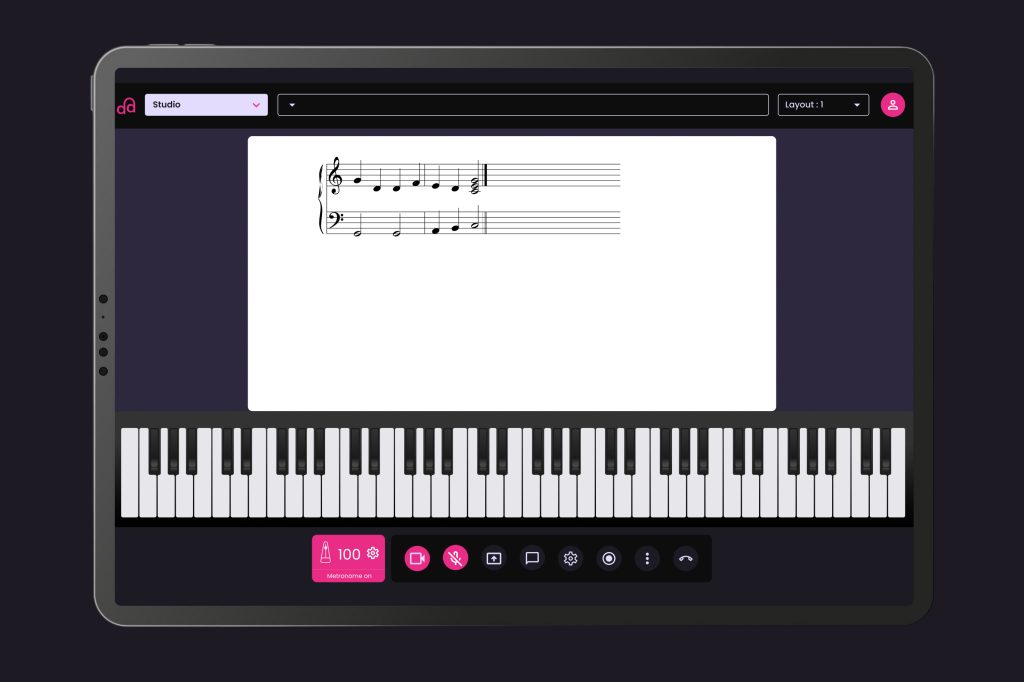
Online piano lessons for kids offers unique advantages in skill development. Students can record themselves practicing, allowing both student and teacher to review the technique objectively. Digital tools provide instant feedback on timing, pitch accuracy, and rhythm that might take weeks to develop through traditional ear training alone. Interactive software gamifies challenging concepts like sight-reading and music theory, making traditionally difficult aspects of music learning engaging rather than tedious.
The global accessibility of online instruction means children aren’t limited to local talent pools. Specialized techniques, cultural music styles, and advanced instruction become available regardless of geographic location. A child interested in learning guitar can access specialists in classical, jazz, blues, or world music traditions without requiring their family to relocate or travel extensively.
Perhaps most significantly, online music classes for kids teach digital literacy alongside musical skills. Children learn to navigate technology purposefully, manage their learning environment, and develop self-direction skills that benefit all areas of their education. These meta-skills prepare them for an increasingly digital world while building musical competencies.
Musical instruments for kids in online settings also offer practical advantages. Families can start with basic or digital versions of instruments, reducing initial investment while children explore their interests. As commitment grows, they can upgrade to acoustic instruments, having already developed foundational skills and confirmed their enthusiasm for continued learning.
The flexibility of online singing classes for kids accommodates different personality types effectively. Shy children often participate more actively when performing from home rather than in front of peers. Confident children benefit from recording capabilities that let them perfect performances before sharing them. Both groups develop musical skills while building comfort with technology that will serve them throughout their academic and professional lives.
Finding the Perfect Musical Path for Your Child
As parents navigate the choice between online and offline music for kids, the answer isn’t universal – it’s deeply personal. The most successful approach considers your child’s learning style, family schedule, budget, and long-term musical goals. Some children thrive in the structured social environment of traditional classes, while others flourish in the personalized, technology-rich world of online instruction.
The beauty of 2025’s musical education landscape lies in its flexibility. Many families discover that a hybrid approach serves them best: combining the convenience and personalized attention of online music classes for kids with occasional in-person workshops, masterclasses, or performance opportunities. This balanced strategy maximizes the advantages of both formats while minimizing their respective limitations.
At Artium Academy, we recognize this evolving landscape and provide world-class online singing classes for kids that combine the best of digital innovation with pedagogical excellence. Our platform features courses curated by legendary musicians, including Sonu Nigam, KS Chithra, Aruna Sairam, Shubha Mudgal, Louiz Banks, Raju Singh, and Ananth Vaidyanathan, offering children access to master-level instruction regardless of their geographic location. With over 30,000 students worldwide, we deliver globally recognized music programs that offer certification options, opening doors to musical opportunities throughout students’ lives.
Whether your child dreams of mastering classical piano, exploring contemporary vocals, or delving into world music traditions, the key lies in choosing an approach that nurtures their natural curiosity while building a solid technical foundation. In our interconnected world, music learning through digital platforms isn’t just an alternative to traditional instruction – it’s often the gateway to musical possibilities that previous generations could never imagine.
FAQs on Online Vs. Offline Music Classes
Both have unique strengths. Online learning suits tech-savvy, busy children and offers expert global access; offline is ideal for those seeking hands-on mentorship, live feedback, and social growth.
Absolutely. Many families blend both approaches to maximize learning, subject variety, and social growth.
Start by considering your child’s personality, your family’s schedule, and your music goals. Try both formats if possible, and see which sparks the most joy and motivation.
Leading platforms, including Artium Academy, provide certifications accepted and respected worldwide, helping students gain recognition and pursue music anywhere.
From piano and guitar to vocals, drums, and more, online platforms offer effective, engaging lessons for a wide range of musical instruments for kids. Whether online or offline, the goal remains: let kids experience the joy of music learning, build lifelong skills, and become the musicians they dream to be today, tomorrow, and always.





